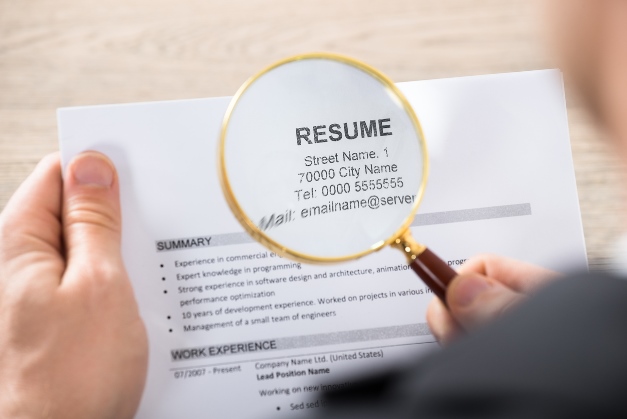Effective resume review is critical to the hiring process. Hiring managers face many challenges when they set out to hire highly qualified new employees. In today’s competitive market, it’s harder than ever to narrow down the pool of applicants to hire the right people.
Bad hires are costly!
Hiring the wrong person for a job is costly. The U.S. Department of Labor has estimated that the average cost of a bad hiring decision can equal 30% of the individual’s projected first-year annual wages. Even entry level hiring mistakes could cost $10,000. For skilled or management positions, bad hires could cost the organization $25,000 or more.
The consequences of a bad hire are not limited to net dollars. Wrong hires also mean disengaged employees who do not meet expectations when it comes to productivity or alignment with the culture of the company. These factors can result in increased employee turnover, negative morale and diminish your employment brand.
Tips on Effective Resume Review
Whether hiring temporary help or permanent employees at all levels, an effective approach to resume screening is a critical part of the hiring process. Recruiters in HR departments and at staffing agencies may screen hundreds of resumes a day. Hiring managers may benefit from having fewer pre-screened resumes to review. Even then, a strong, consistent review process is important in choosing the best candidates to move forward in the hiring process. Often this will be interviewing a handful of the best candidates. For lower level temporary positions where time is critical, candidates may be selected by the resume screening.
Define a candidate profile and wage/salary level for the position: An effective resume review process begins well before the actual screening starts. First it is important to start with an up-to-date and accurate job description for the position to be filled. A good job description will include the key competencies needed for the position, including experience, skills, and education. Determine a realistic compensation level for the qualifications and experience you are seeking. This information should be used to develop the job posting to which candidates will respond. When appropriate, including the compensation range is helpful in targeting relevant candidates.
Use the description and posting to develop a list of the most important required and desired attributes of the job and use this list in a consistent manner to screen the resumes.
Initial screen: Once the resumes are received, it can be helpful to do an initial screen to group them based on the criteria you have defined to “yes”, “no” and ‘maybe” categories of candidates or use a simple scale to rank them. Review the cover letter if it’s included. A good cover letter can provide you with an idea of the candidates’ writing skills, attention to detail and to distill the essence of their qualifications for the position. Note that these days covers letters often are not included, particularly with online applications. Scan the Summary, Skills and Education sections for basic attributes.
Resume Review: For the Yes (or A, etc.) group, review job experience, with attention to most recent positions. Check on the quality of experience and its relevance to the job in question. Also, check whether the candidate’s education levels match your criteria. Note their accomplishments and how they have contributed to their organizations.
Look for patterns of career changes, growth or job changes on the resume. Frequent job changes in a very short time, changes in career direction and long gaps in employment may indicate need for further exploration if all other criteria match. Make a note of whether job changes involve promotions, lateral moves, indicate progress or are simply random. Special skills, certifications, languages spoken and other training relevant to the job should be looked at in detail.
A single typo shouldn’t necessarily rule out an otherwise strong candidate, but many typos and bad grammar may.
All of this seems like a lot, but after getting some experience and becoming familiar with the criteria for the position you’ll move fairly quickly through each resume and narrow down the selection to the best prospects.
You want the best candidates, which means the right qualifications and the right fit for the position and your organization. Be realistic in your expectations. You can’t see everything in a resume.
If you have any questions about the process, ask your HR representative or staffing agency contact.
Now get ready to interview!

